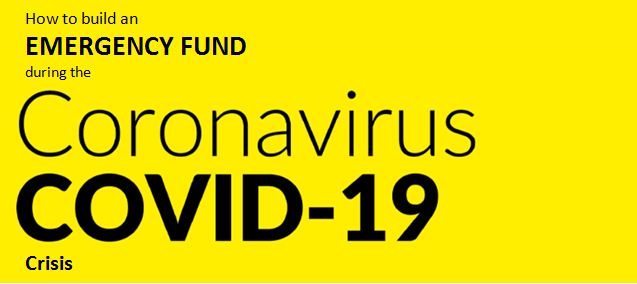By Frank Conway
The Coronavirus is has upended life in dizzying speeds across Ireland impacting everyone! In this article, I am going to address a topic that has always been a key pillar of the MoneyWhizz financial wellbeing philosophy.
Emergency fund or rainy-day fund, its much the same
Call it a rainy-day fund or emergency fund, either name means the same things; money for when things get ugly and with the coronavirus, this is as ugly as it gets!
I always recommend people build an emergency fund equivalent of 3 – 6 months day-to-day living expenses. Doing so in the best of times takes time but in this coronavirus emergency, time is of the essence. For many people, if they have not yet lost income, in the coming weeks, they face a significant risk of doing so, even factoring for the recently announced State supports. Because of this, a more drastic approach is required to ensure this important line of financial defence is put in place. It is important, even at this stage to focus on building an emergency fund as we really have no idea of how difficult things may become as the Covid-19 emergency continues to unfold.
Even small amounts of savings can make a big difference in a financial crunch which is why your emergency fund can start out modestly if you need to. It might mean being able to pay a gas or electricity bill, repairing a car or paying for essential protections. Where a family is unable to save a lot, I usually encourage them to start small, with even €250 and work from there. Remember, every euro saved is a euro more to pay essential expenses.

Make money visible! – Many major employers and smaller ones too have given advance notice of what they plan to do in response to Covid-19. For example, some are reducing wages by 50% whereas others are planning to make employees temporarily redundant. Using this information, employees have some advance notice of how they will be impacted financially. Of course it also goes without saying that other employees have not been so well informed and have experienced loss of income overnight.
Treat your money as a most precious resource and eliminate excess spending – First, go through your spending with a fine tooth comb. It may feel alien and for some, a painful reminder of life during the great recession but Covid-19 presents a totally unique challenge. This is the time to put your financial survival ahead of all else. Start with your current account statement and move onto credit card statements and question all expenses. Question whether they are a need or a want. If they are the latter, now is the time to really challenge whether or not you keep paying for it. Or, can you switch to an alternative provider. There are many excellent comparison sites that let you compare the best deals on the market for utilities and other services. If you require some guidance on this, use the FREE MoneyWhizz Personal Budgeting Sheet.
Keep credit on standby – The next step is to identify possible sources of ready-to-use credit. If for example someone has a credit card limit of €3,000 and typically repays their credit card bill every month, this is a source of credit they should keep available in the event they need it to bridge a financial gap later. The same applies to a current account overdraft. This is survival time to keep stock of all sources of financial resources available that you do not have to apply for.
Income tax refund – You may be due an income tax refund from Revenue as a result of being made redundant. If you are, save as much of it as you can. This could provide an essential financial lifeline in the difficult weeks or months ahead. If you are unfamiliar with how this works, you should can use both Citizens Information (www.citizensinformation.ie) or Revenue (www.revenue.ie) to get the necessary details.
Stop food waste – Food waste is a major source of financial waste in Ireland and it is estimated households waste €700 per year in unused foods. Plus, the cost of disposing of wasted food simply means the cost is even greater. You can read our 10 Practical Steps to Reduce Food Waste to learn how you can reduce food waste, save money and help the environment too!
Review pension contributions, for now! – Depending on your situation, if you have a partner that has lost their job and you are still fully employed and you are currently contributing to an occupational pension scheme or PRSA, you may want to consider temporarily reducing contributions and redirecting the money to an emergency fund. Of course, we highly recommend you always do as much as you can to keep contributing to your retirement fund but your first focus should be to survive the next 6 or 12 months financially.
One example here might be to stop contributing into an Additional Voluntary Contribution if you have one. You can always start an AVC later but for now, you are looking to protect your financial wellbeing. Also, talk with your employer and get them to confirm what impact there will be if you cease contributing to the company pension plan.
Claiming back on tax relief owed to you – Some estimates put the value of unclaimed tax-relief from revenue to be several hundred million euro. Many people may have medical expenses which attract tax-relief of 20% which can be claimed for up to four years in arrears. There are many more forms of tax-relief that are claimable and can put up to hundreds of euro back in the pockets of rightful owners. Read more HERE.
Tap home equity – If you own a home and have built up a lot of equity, it might still be possible to take out a debt-consolidation loan but this will depend on having the financial capability to meet debt-service ratio limits. Over the last 6 years, the recovery in property prices in Ireland means many more homeowners have significant home equity to borrow against. One thing to keep in mind here is the total cost of credit. If you can, try borrow over a shorter period of time rather than longer as this will keep interest charges lower. Of course, it also goes without saying that in the current environment and with banking resources directed to customer support, there is unlikely to be major underwriting resource in place so loan applications may not get reviewed or approval for some time.
Once you have a built up an emergency fund, be prepared to use it when needed but also be looking for ways to grow it when opportunities arise.
Frank Conway is a qualified financial adviser and Founder of MoneyWhizz.


Comments are closed.